- Home
- Quizzes
- My Quiz Activity
- Newsletters
- Sports Betting
- MY FAVORITES
- Add Sports/Teams
- SPORTS
-
NFL
- NFL Home
- Arizona Cardinals
- Atlanta Falcons
- Baltimore Ravens
- Buffalo Bills
- Carolina Panthers
- Chicago Bears
- Cincinnati Bengals
- Cleveland Browns
- Dallas Cowboys
- Denver Broncos
- Detroit Lions
- Green Bay Packers
- Houston Texans
- Indianapolis Colts
- Jacksonville Jaguars
- Kansas City Chiefs
- Las Vegas Raiders
- Los Angeles Chargers
- Los Angeles Rams
- Miami Dolphins
- Minnesota Vikings
- New England Patriots
- New Orleans Saints
- New York Jets
- New York Giants
- Philadelphia Eagles
- Pittsburgh Steelers
- San Francisco 49ers
- Seattle Seahawks
- Tampa Bay Buccaneers
- Tennessee Titans
- Washington Commanders
-
MLB
- MLB Home
- Athletics
- Arizona Diamondbacks
- Atlanta Braves
- Baltimore Orioles
- Boston Red Sox
- Chicago White Sox
- Chicago Cubs
- Cincinnati Reds
- Cleveland Guardians
- Colorado Rockies
- Detroit Tigers
- Houston Astros
- Kansas City Royals
- Los Angeles Angels
- Los Angeles Dodgers
- Miami Marlins
- Milwaukee Brewers
- Minnesota Twins
- New York Yankees
- New York Mets
- Philadelphia Phillies
- Pittsburgh Pirates
- San Diego Padres
- San Francisco Giants
- Seattle Mariners
- St. Louis Cardinals
- Tampa Bay Rays
- Texas Rangers
- Toronto Blue Jays
- Washington Nationals
-
NBA
- NBA Home
- Atlanta Hawks
- Boston Celtics
- Brooklyn Nets
- Charlotte Hornets
- Chicago Bulls
- Cleveland Cavaliers
- Dallas Mavericks
- Denver Nuggets
- Detroit Pistons
- Golden State Warriors
- Houston Rockets
- Indiana Pacers
- Los Angeles Clippers
- Los Angeles Lakers
- Memphis Grizzlies
- Miami Heat
- Milwaukee Bucks
- Minnesota Timberwolves
- New Orleans Pelicans
- New York Knicks
- Oklahoma City Thunder
- Orlando Magic
- Philadelphia 76ers
- Phoenix Suns
- Portland Trail Blazers
- Sacramento Kings
- San Antonio Spurs
- Toronto Raptors
- Utah Jazz
- Washington Wizards
-
NHL
- NHL Home
- Anaheim Ducks
- Boston Bruins
- Buffalo Sabres
- Calgary Flames
- Carolina Hurricanes
- Chicago Blackhawks
- Colorado Avalanche
- Columbus Blue Jackets
- Dallas Stars
- Detroit Red Wings
- Edmonton Oilers
- Florida Panthers
- Los Angeles Kings
- Minnesota Wild
- Montreal Canadiens
- Nashville Predators
- New Jersey Devils
- New York Islanders
- New York Rangers
- Ottawa Senators
- Philadelphia Flyers
- Pittsburgh Penguins
- San Jose Sharks
- Seattle Kraken
- St. Louis Blues
- Tampa Bay Lightning
- Toronto Maple Leafs
- Utah Hockey Club
- Vancouver Canucks
- Vegas Golden Knights
- Washington Capitals
- Winnipeg Jets
- NCAAF
- NCAAM
- Olympics
- Boxing
- Entertainment
- Lifestyle
- Golf
- MMA
- Soccer
- Tennis
- Wrestling
- More Sports
- RESOURCES
- My Account
- YB on Facebook
- YB on Twitter
- YB on Flipboard
- Contact Us
- Privacy Policy
- Terms of Service

The last 20 captains at Manchester City
If you are a football fan of a certain age, you know Manchester City as one of the biggest, most-successful clubs in the world. If you are just a bit older, you remember before that, when they were consistently a mid-table club. And hey, if you are a bit older still, you remember when Man City was relegation fodder. Through it all, captains of the club have come and gone. Some, obviously, have seen more success than others. Here are the last 20 players to captain Manchester City.
Paul Power
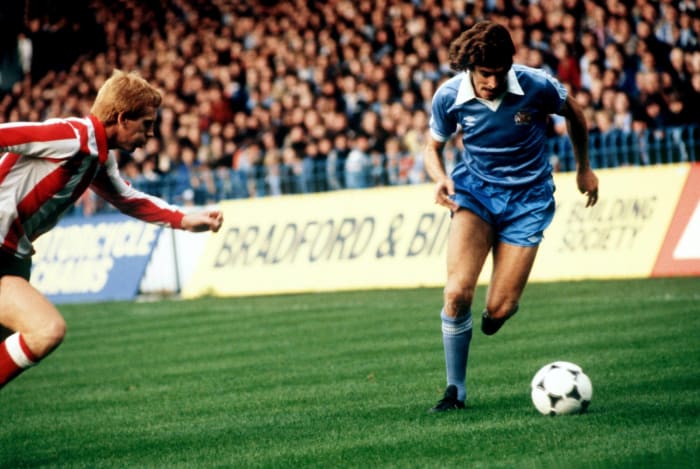
Power, a Manchester boy born and raised, spent the bulk of his career playing left back for Manchester City. He started there in 1976, but took over as captain in 1979. Power captained them to an FA Cup Final in 1981, but was also captain in the 1982-83 season that saw City relegated. He got them promoted back to the First Division (then the top league in England) two seasons later, and left them after the 1985-86 season. Power ended his career at Everton, where he won a league title.
Kenny Clements

Clements made over 100 appearances for City, left, made over 200 appearances for Oldham Athletic, and then returned to City. The defender took over as captain for Power, and served in that role in the 1986-87 and 1987-88 seasons, after which he left the club again. Notably, in Clements’ first year as captain, the team finished 21st and was relegated, and after failing to help lead the club back up, he moved on to Bury.
Steve Redmond

Oddly, the centre back Redmond also played for Man City, Oldham, and Bury. He debuted with City as an 18-year-old, and when he was named captain for the 1988-89 season, he was the youngest captain in club history. City got promoted, and Redmond’s position was cemented. It helped that he played in every single game for the club his first two seasons as captain. Redmond helped keep Manchester City in the First Division, but on the verge of the birth of the Premier League, City brought in Michel Vonk, who played the same position, and Redmond transferred out to Oldham.
Terry Phelan
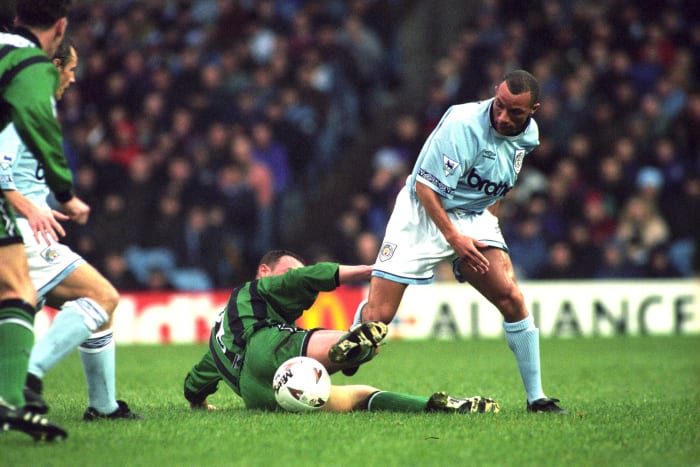
For the inaugural Premier League season, 1992-93, Phelan was named captain by Man City. It was his first season with the team, but the defender was fresh off making his national debut with Ireland, who he would be capped for 42 times. His transfer fee, at the time, was a record for the club, as well as for a defender in British football. While Phelan would stay with the club through the 1994-95 season, he was only the captain for that one year.
Keith Curle

Curle, a centre back, played professionally from 1981 through 2005. He made over 700 league appearances, and even got to play for England three times. As such, we wouldn’t necessarily blame Curle for what happened while he was captain. It’s probably more on the club for firing Paul Reid after the 1992-93 season when City finished ninth (to be fair, Reid was a player-manager, unusual for a Premier League-level club). What we know is that City finished 16th, 17th, and 18th in Curle’s three seasons as captain, the last of which got it relegated. Curle, with more ambition than second-tier football, moved on to Wolves.
Kit Symons

Symons, another defender, is more associated with Fulham, where he made 102 league appearances and served as a scout, an assistant coach, head of analytics, and manager at different times. The Welshman may want his time at Manchester City forgotten. His first season was when they got relegated. Symons took over as captain for Curle, and in his second season in the role, 1997-98, the club finished 22nd in the second tier of English football. That got them relegated down to the third level. Think of where City is as a club now. It’s come a long way. Symons took off for Fulham after the relegation.
Jamie Pollock

Pollock was captain for only a blip. The defensive midfielder had the role to start the 1998-99 season, but only shortly. He is perhaps best remembered for what happened at the end of the 1997-98 campaign. In the second-to-last game of the season, Pollock scored an own goal against QPR that resulted in City being relegated and QPR staying up. It’s an infamous moment in English soccer, one that has been brought up to Pollock over the years. However, he has a good sense of humour about it, he says City fans were actually quite supportive, and QPR fans have loved him ever since.
Andy Morrison
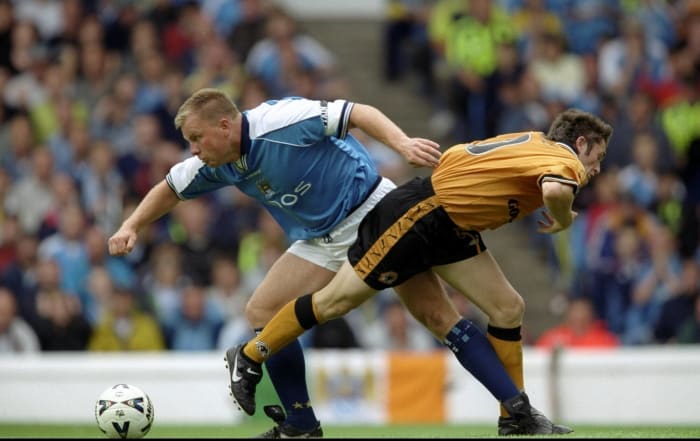
The reason Pollock’s captaincy was so swift was because Morrison quickly established himself as the tone-setter for the club. After the drop to what was then called Division 2, City signed the tenacious Scottish veteran to serve in the center of the defence. Morrison scored in the first two games of the campaign, and was swiftly given the captaincy. In his two seasons as captain, City got promoted twice, returning to the Premier League for the 2000-01 season. However, due to injuries and some tempestuousness, Morrison spent a lot of his time loaned to other clubs, and he no longer served as captain.
Alfie Haaland
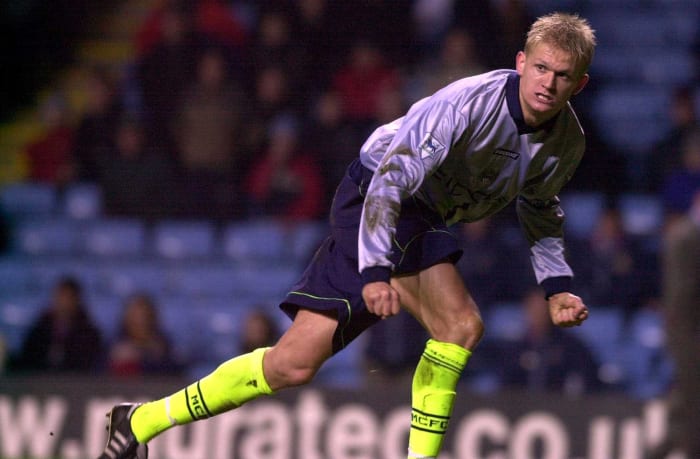
It was Haaland who was named captain when Man City returned to the Premier League. He made history as the first club captain from mainland Europe. Also, yes, he is the father of Erling Haaland. His captaincy only lasted one season, though, because, well, City got relegated again.
Stuart Pearce
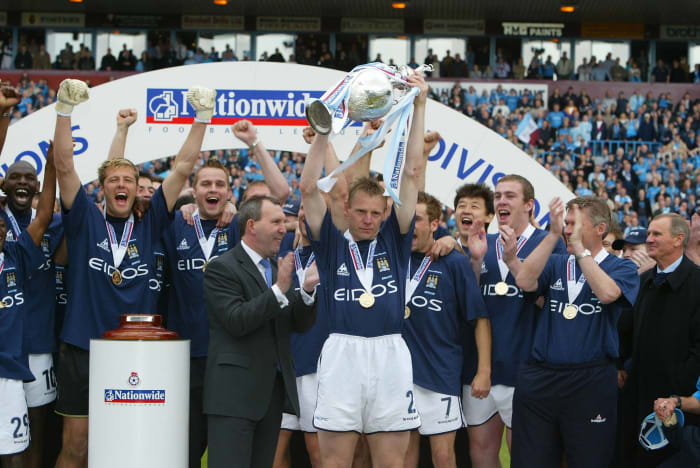
It seems odd to bring in a guy nicknamed “Psycho” to help right the ship, but that’s what Manchester City did. Pearce is an icon at Nottingham Forest, and he saw 78 caps with England, but his last was in 1999. The defender was at the end of his career, so he popped down a division, played for City, and took on the captain’s role. Man City proceeded to finish first and got promoted right back up. Ever since, the club has been in the Premier League. Pearce proceeded to retire at the end of the season but he would return to manage the club for a couple seasons in the 2000s.
Ali Benarbia

The Algerian Benarbia made history as the first non-European captain for Manchester City. After a career spent in France, the midfielder came to England and joined City for the 2001-02 season. Benarbia was named the club’s player of the year, and made the all-league squad, making him an easy choice to replace Pearce at captain. Alas, the move up to the Premier League proved a little tough for Benarbia, who did not excel. He would spend the rest of his career playing in Qatar.
Sylvain Distin

Distin also came over from France to join City, but he waited until they were back in the Premier League. He actually chose City over Newcastle because he wanted to play centre back, and Newcastle wanted him on the left side of the defence. Distin took over as captain in 2003 and was in the role through the 2005-06 season. He ended up making over 200 total appearances both with City and, later, with Everton.
Richard Dunne
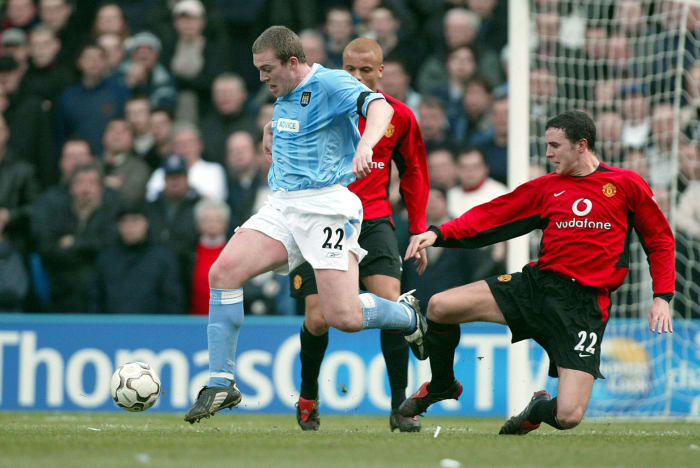
Dunne, also a centre back, had been a staple with City since 2000, but he was only 26 when he was named club captain. Dunne is notably the last player named captain at Manchester City before the current ownership group — and the subsequent influx of cash — took over. The Irish international player (80 caps for his country) was captain from 2006 into 2009. At this point, the money was starting to bring in bigger names, and Dunne was the odd man out. He moved to Aston Villa, where he made 111 appearances.
Kolo Toure
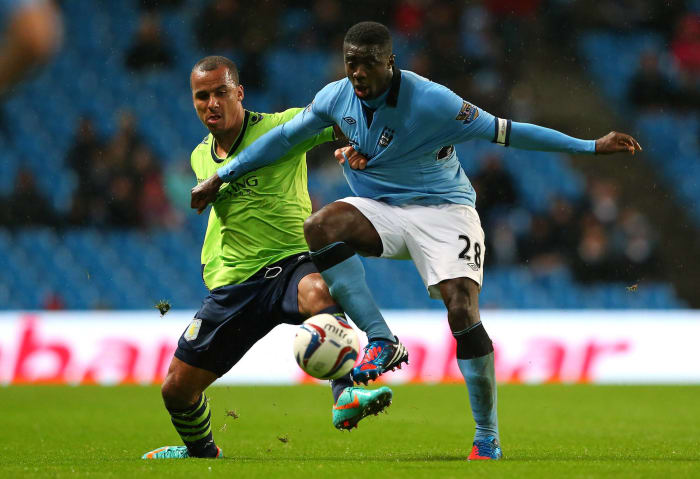
Toure was one of the guys who arrived to City that led to Dunne moving on. Kolo had been a part of the “Invincibles” club at Arsenal, where he played well over 200 games. After that run, he moved to Manchester City. Toure was immediately named captain, and City made its first strides toward the modern era, finishing fifth. However, the 2009-10 season also saw Mark Hughes sacked and replaced by Roberto Mancini. Mancini decided to name his own captain for the following year, but Toure stayed around until 2013.
Carlos Tevez
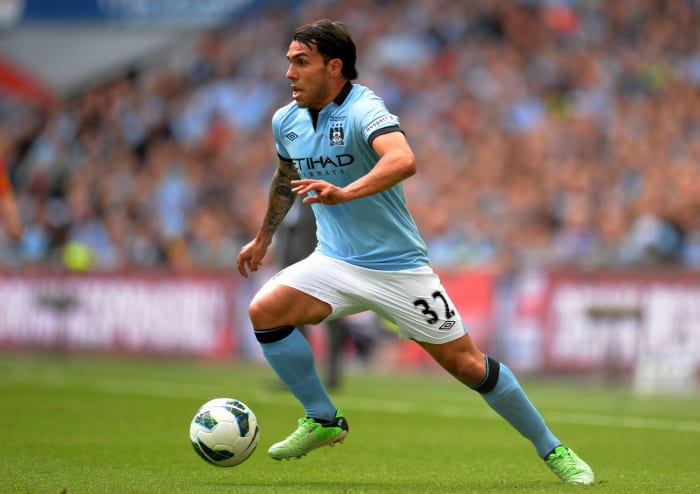
Mancini made Tevez his first captain. That was an unusual choice, because Tevez was a forward. Also, because Tevez had a tumultuous career up to that point. The tumult continued to be the case during the 2010-11 campaign. That didn’t stop Tevez from scoring 20 goals, but the chaos was enough that Mancini decided to name a new captain for the 2011-12 season.
Vincent Kompany
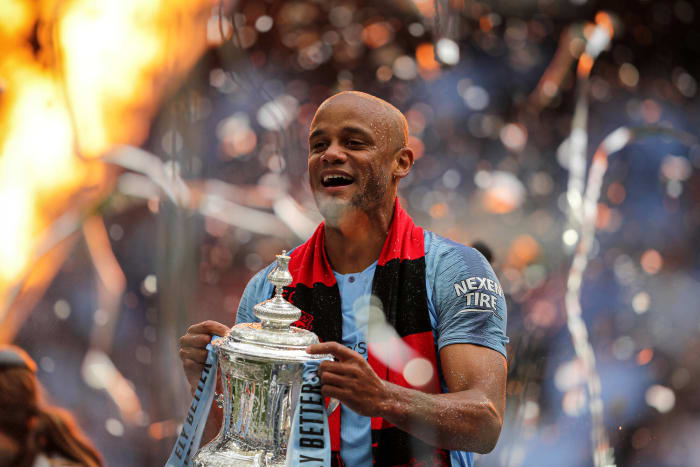
You may have noticed Manchester City has not exactly had lengthy runs at captain. There will be more examples of that. Kompany is different, though. The Belgian defender became captain in 2011, and that season City broke through and won the title. Kompany remained captain through the 2018-19 season, which was capped by the fourth title for the club in his tenure. That was effectively the end for Kompany, who went back to his first club Anderlecht to enjoy a victory lap on a great career. He did return to the Premier League recently, though, as manager of Burnley.
David Silva
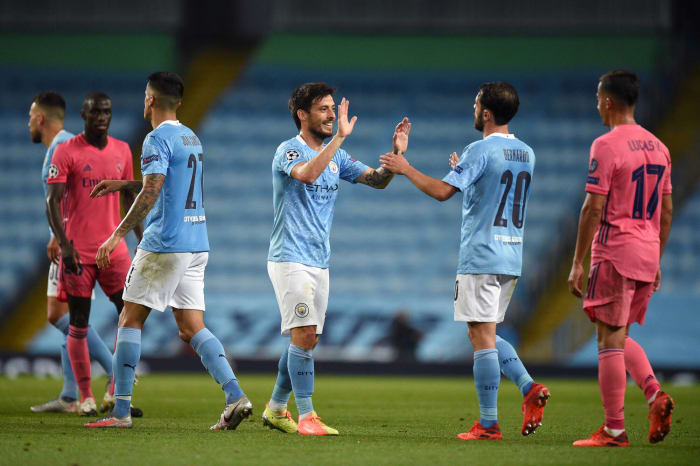
Replacing Kompany as captain was going to be onerous. Fortunately, a modern legend of football had been around for a decade. Silva, the iconic Spanish midfielder, had played a key role in City’s sides for a long time. When Kompany went back to Belgium, Silva slid in as captain. Then, Silva pulled a similar move to his former teammate. After one season as captain, Silva went back to Spain, where he played for Real Sociedad. Even so, Silva and Kompany are two of the City players with statues outside the Etihad now, alongside Sergio Aguero.
Fernandinho
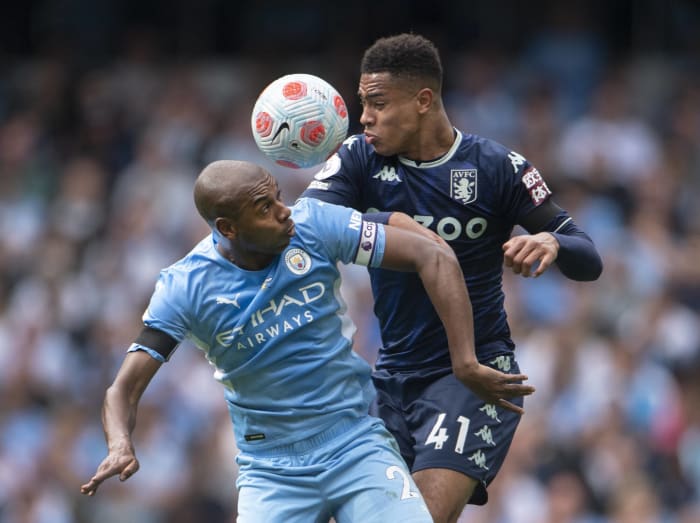
Ferandinho splits the difference between Kompany and Silva, which is to say he is a defensive midfielder. Arguably one of the best at that role of his generation for good measure. The Brazilian had been with the club since 2013, and so the veteran stepped into the role. He was captain for two seasons, both of which ended with titles. Fernandinho is still playing, but he’s now back in his native Brazil.
Ilkay Gundogan
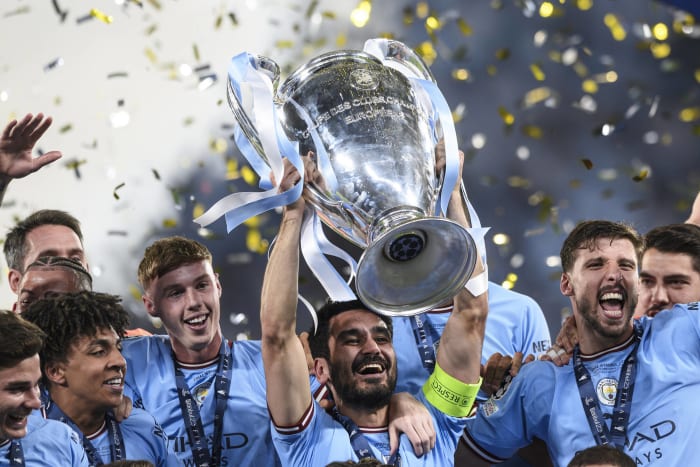
Gundogan was only captain for one season at City, 2022-23. Even so, he’ll go down as a legend. The German international was quite good on the pitch, as per usual, but there’s also the team success. Gundogan was captain for a treble-winning team, which included City’s first Champions League title. With that accomplished, the midfielder left the club for Barcelona.
Kyle Walker
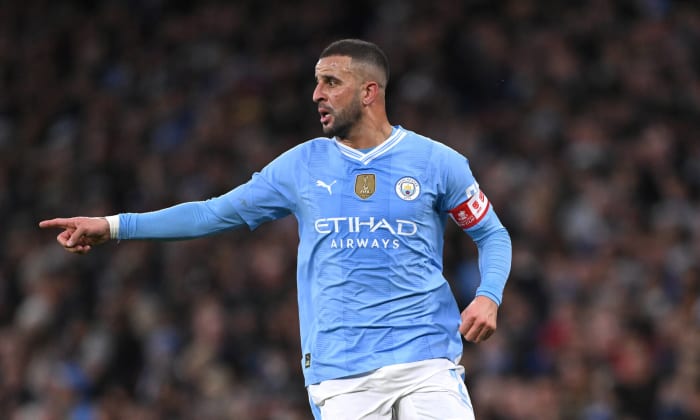
Walker is still freshly in the captain’s role. The English defender, a staple of the national team as well, was given the armband for the 2023-24 season. As a regular feature for the club since 2017, he was an easy choice. Will Walker give Manchester City more than two seasons as captain? We shall see.
Chris Morgan is a Detroit-based culture writer who has somehow managed to justify getting his BA in Film Studies. He has written about sports and entertainment across various internet platforms for years and is also the author of three books about '90s television.
More must-reads:
- Pomp and protest: Unbeaten Columbus, Miami to square off in Cleveland
- Manchester United and Tottenham keep seasons alive with Europa League heroics
- The 'NBA postseason three-pointers made leaders' quiz
Breaking News
Customize Your Newsletter
 +
+
Get the latest news and rumors, customized to your favorite sports and teams. Emailed daily. Always free!
PRIVACY POLICY EDITORIAL POLICY CONTACT US
ABOUT YARDBARKER TERMS OF SERVICE
Use of this website (including any and all parts and
components) constitutes your acceptance of these
Terms of Service and Privacy Policy.
This site is for entertainment purposes only.
There is no gambling offered on this site.
Gambling Problem? Call 1-800-Gambler.
